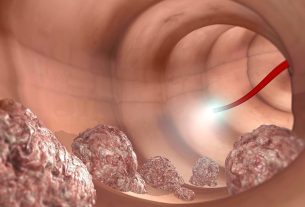The CEA exam is used to check the levels of carcinoembryonic antigen (CEA) in the blood, a protein that can be produced at abnormal levels in the case of some tumors, such as colorectal and thyroid cancer, and diseases, such as gastritis and diabetes.
This exam is mainly indicated to monitor the response of colorectal or thyroid cancer to treatment and help identify the tumor if it returns after removal by surgery, for example.
In case of changes in the CEA exam, especially if symptoms such as weight loss or diarrhea appear, it is recommended to consult an oncologist or general practitioner. Although high levels are not always indicative of cancer, they may indicate other diseases that require treatment.

What is it for
The CEA exam is recommended for:
- Monitor response to treatment with surgery, chemotherapy and/or radiotherapyin case of colorectal or thyroid cancer, for example;
- Confirm that colorectal or thyroid cancer has been completely removed after surgery;
- Identify whether colorectal or thyroid cancer has returned after treatment with surgery.
Additionally, the CEA exam can sometimes be used to help evaluate fluid accumulation in the abdomen, known as ascites, or lungs, in this case called pleural effusion, and may be indicative of tumors or metastases.
How to understand the result
The blood CEA values considered normal are:
- In smokers: up to 5,0 ng/mL;
- In non-smokers: up to 3,0 ng/mL.
However, the reference value for the CEA exam may vary depending on the laboratory, and it is also important to take into account whether or not the person is a smoker in order to correctly interpret the result.
It is common for CEA levels in the blood to be increased in some people without any malignant change, however when the value is greater than 20 ng/mL, it may be indicative of cancer with possible metastases.
Possible causes of increased CEA
In addition to colon or thyroid cancer, the CEA test result may be increased in cases of:
- Smokers;
- Gastritis;
- Chronic obstructive pulmonary disease (COPD);
- Diabetes;
- Lung infections;
- Inflammatory bowel disease;
- Other tumors, such as pancreatic, breast or lung cancer.
Therefore, high levels of CEA in the blood are not always indicative of tumors and the doctor usually recommends other tests to confirm the diagnosis. Discover the main tests that detect cancer.
Bibliography
- HALL, Claire et al. A Review of the Role of Carcinoembryonic Antigen in Clinical Practice. Ann Coloproctol. Vol.35, n.6. 294-305, 2019
- CLEVELAND CLINIC. CEA Test (Carcinoembryonic Antigen). Disponível em: <https://my.clevelandclinic.org/health/diagnostics/22744-cea-test-carcinoembryonic-antigen#:~:text=A%20note%20from%20Cleveland%20Clinic,these%20tests%20to%20diagnose%20cancer>. Acesso em 02 jun 2023
- STATPEARLS. Carcinoembryonic antigen. 2023. Available at: <https://www.ncbi.nlm.nih.gov/books/NBK578172/>. Accessed on 02 Jun 2023
- MIKSAD, Rebecca A; MEROPOL, Neal J. Carcinoembryonic Antigen-Still More to Learn From the Real World. JAMA Oncol. Vol.4, n.3. 315-316, 2018
- SCIENCE DIRECT. Carcinoembryonic antigen. Disponível em: <https://www.sciencedirect.com/topics/medicine-and-dentistry/carcinoembryonic-antigen>. Acesso em 07 jan 2021

Sign up for our newsletter and stay up to date with exclusive news
that can transform your routine!
Warning: Undefined array key "title" in /home/storelat/public_html/wp-content/plugins/link-whisper-premium/templates/frontend/related-posts.php on line 12
Warning: Undefined array key "title_tag" in /home/storelat/public_html/wp-content/plugins/link-whisper-premium/templates/frontend/related-posts.php on line 13



